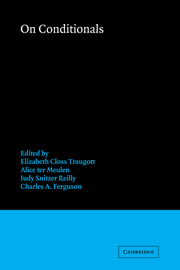1 - OVERVIEW
Published online by Cambridge University Press: 04 August 2010
Summary
If the organism carries a ‘small-scale model’ of external reality and of its own possible actions within its head, it is able to try out various alternatives, conclude which is the best of them, react to future situations before they arise, utilize the knowledge of past events in dealing with the present and the future, and in every way to react in a much fuller, safer, and more competent manner to the emergencies which face it.
(Craik 1943:61)INTRODUCTION
Conditional (if–then) constructions directly reflect the characteristically human ability to reason about alternative situations, to make inferences based on incomplete information, to imagine possible correlations between situations, and to understand how the world would change if certain correlations were different. Understanding the conceptual and behavioural organization of this ability to construct and interpret conditionals provides basic insights into the cognitive processes, linguistic competence, and inferential strategies of human beings.
The question of what a conditional construction is may be answered in many different ways, and from many different perspectives. The linguistic characterization of conditionals in different languages provides the basis for linguistic universals, which presumably at least in part constrain the way we reason. The diachronic point of view provides knowledge of the possible adaptations that a system of conditionals may undergo, and may detect dependencies on developments in other linguistic domains. Studies of language acquisition provide additional perspectives on a linguistic system, offering not only developmental data but also insights into the basic components and relationships of the adult system.
- Type
- Chapter
- Information
- On Conditionals , pp. 3 - 20Publisher: Cambridge University PressPrint publication year: 1986
- 6
- Cited by



